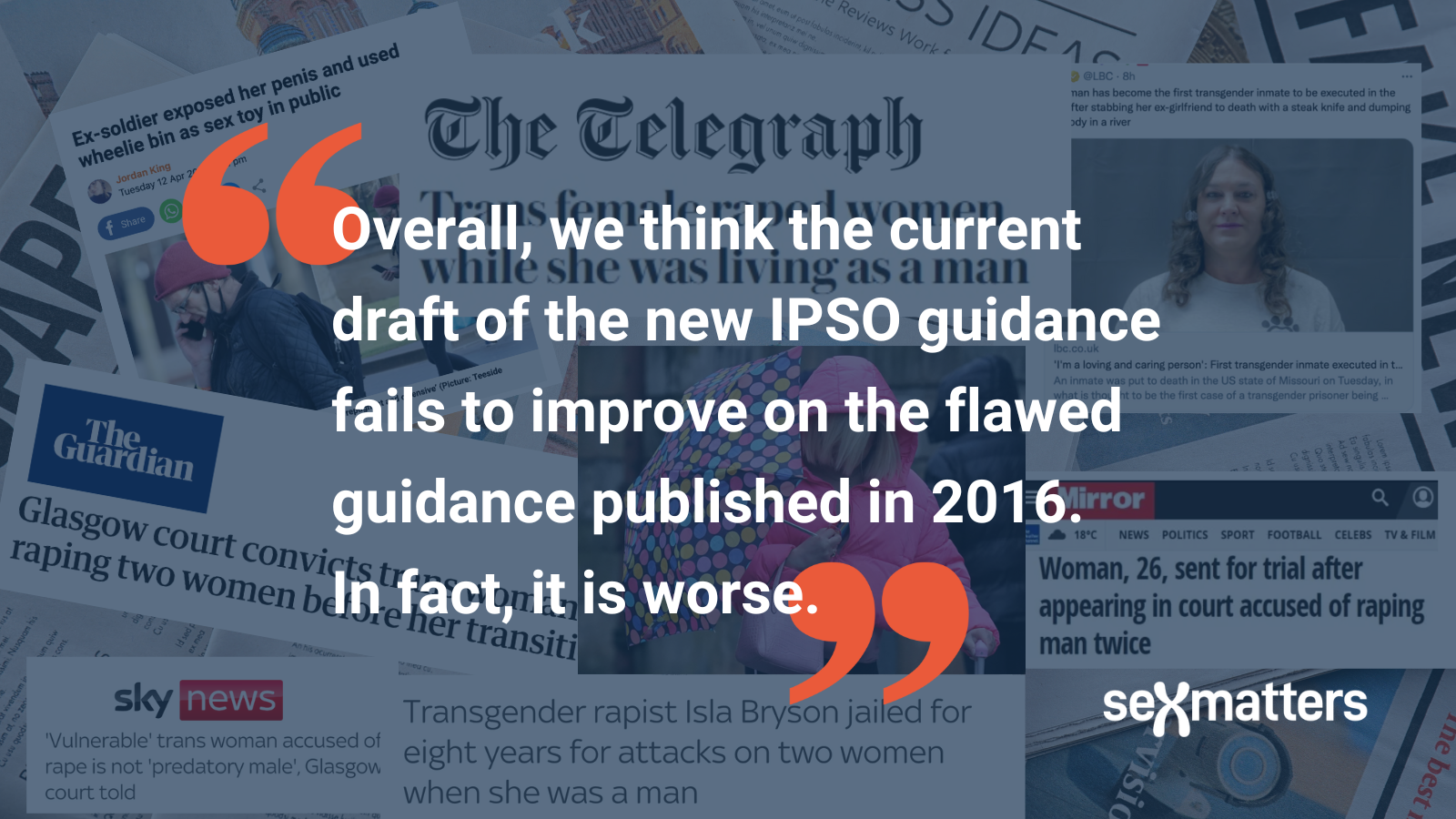IPSO’s updated guidance – our response

IPSO, the Independent Press Standards Organisation, has published draft Guidance on reporting of sex and gender identity to replace its 2016 publication, Guidance on researching and reporting stories involving transgender individuals. Sex Matters has written a response to the consultation and hopes that the final guidance will be improved based on the feedback received.
IPSO guides are not meant to be prescriptive, but to help member organisations understand how to apply the general principles of the Editors’ Code of Practice such as accuracy, privacy and discrimination to particular tricky circumstances. But in practice, media outlets have tended to interpret IPSO’s guidance as a requirement to use “preferred pronouns” and refer to people as female/women and male/men according to their self-identification rather than their sex.
The new draft guidance recognises that:
“Reporting on sex and gender identity can generate wide and fierce debate. Journalists and editors are free to inform, scrutinise and challenge on this topical issue.”
This is positive; however, IPSO does not define the concepts of sex and gender identity, nor does it address the crucial question of how they relate to each other. Journalists and editors are left without clarity about whether publishing accurate information about a trans person’s sex conflicts with respecting their privacy, or whether (as some activists argue) referring to sex in such instances could constitute discrimination.
Striking the wrong balance
The draft guidance states that it “strikes a balance between the rights of the public to freedom of speech and the rights of the individual not to face personal discriminatory abuse”. But it encourages an expansive conception of what might constitute “discriminatory abuse” that will have a chilling effect. While the previous guidance asked editors to consider in relation to trans-identifying people: “Is the terminology being used pejorative or prejudicial?” the new guidance goes further, warning that:
“References to someone’s gender identity and/or sex may be pejorative, even in the absence of any pejorative term.”
It is highly irresponsible to give such vague and sweeping encouragement for self-censorship when journalists and the media are under intense pressure from lobby groups not to report clearly and accurately on sex and gender issues.
Overall, we think the current draft fails to improve on the flawed guidance published in 2016. In fact, it is worse. It is so vague, and so unrelated to the issues that arise in practice, that it is unlikely to provide any meaningful support for editors and journalists seeking to stand up to lobbyists’ demands that they cast aside accuracy.
The question editors want answered is whether it is acceptable to mention a trans-identified person’s (biological) sex. For example, is it acceptable when that person is a rapist seeking admission to a women’s prison? When a male athlete is seeking to compete as a female? When a heterosexual man is self-describing as a lesbian? In each of these cases the man’s sex is more relevant to other people than his gender identity is.
Female prisoners are harmed when incarcerated alongside men; female athletes lose out when male athletes are allowed to compete with them; and lesbians by definition do not consider men as acceptable sexual partners, no matter how those men identify. The press should report accurately and fearlessly about these issues.
It is sometimes possible to refer to someone with neutral terms (describing them as a teacher, police officer, spokesperson, individual or defendant, for example) in stories where their sex is not relevant. But even in such stories there is no general prohibition against identifying a person’s sex.
Journalists do not need to follow the Equal Treatment Bench Book
The guidance includes a section specifically on reporting on transgender defendants in court cases.
Here it says that while the principles under the Editors’ Code remain the same regarding accuracy, privacy, and discrimination, journalists should pay attention to the Equal Treatment Bench Book (Sex Matters has written about the problems with the Equal Treatment Bench Book previously).
Journalists have an obligation to ensure that they report accurately. If what happened in court was that a male person was addressed and referred to as a woman, then this is what journalists have an obligation to report. Journalists should not simply report words verbatim, if it is known that those words on their own are likely to mislead readers.
These are some of the people who have been called “she” in judgments and hearings by English courts.
| Brandon/Chloe Walker | Sean/Rose Taylor | “V” | “MxM” | Mathew/Rose Whitby |
 |  |  |  |  |
If a court wishes to compel journalists to withhold information from the public domain, it must do this via a court order.
